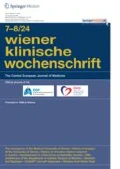Summary
Background
Austrian medical universities have not covered the topic of Nazi medicine in their curricula to any satisfactory degree to date. In the context of medical-ethical education and on-going medical ethics debates, it seems indispensable to be confronted also with the dark chapters of medical history, and especially Nazi medicine. Students should learn to understand controversial discussions, e.g. about euthanasia, in a historical context. The purpose of this study was to investigate whether students had, during their studies, been confronted with Nazi medical crime and whether they considered such a confrontation as important. The survey also focused on extant knowledge about this topic.
Methods
From late 2012 to May 2013, 341 late semester students of the medical universities in Vienna, Graz, and Innsbruck were questioned about the coverage of Nazi medicine during their courses, using multiple choice questionnaires. The data were evaluated using a descriptive-statistical approach.
Results
The study has shown a low level of knowledge of students about Nazi medicine in the three universities. Only a third of the students had ever heard about “Aktion T4”. About 65% of the participants found it important to be comprehensively informed about Nazi medicine during their studies, e.g. with a view to their future career. On average across the three universities, only 43% of the students had been confronted with this topic.
Conclusion
The study found a clear wish for more information about Nazi medicine. Universities should, therefore, offer students various opportunities and ways of discussing this issue in the university context.
References
Czarnowski G. Österreichs “Anschluss” an Nazi Deutschland und die österreichische Gynäkologie. In: Anthuber C, et al., editors. Herausforderungen. 100 Jahre Bayerische Gesellschaft für Geburtshilfe und Frauenheilkunde. Stuttgart: Thieme; 2012. pp. 138–48. www.bggf.de/cms/index.php.
Ebbinghaus A, Dörner K, editors. Vernichten und Heilen. Der Nürnberger Ärzteprozeß und seine Folgen. Berlin: Aufbau-Verlag; 2001.
Eckart WU. Medizin in der NS-Diktatur. Ideologie, Praxis, Folgen. Köln: Böhlau Verlag; 2012.
Klee E. Euthanasie im NS-Staat. Die “Vernichtung lebensunwerten Lebens”. Frankfurt a. M.: Fischer Verlag; 1985.
Freidl W, Sauer W, editors. NS-Wissenschaft als Vernichtungsinstrument. Rassenhygiene, Zwangssterilisation, Menschenversuche und NS-Euthanasie in der Steiermark. Wien: Facultas; 2004.
Häupl W. Die ermordeten Kinder vom Spiegelgrund. Gedenkdokumentation für die Opfer der NS-Kindereuthanasie in Wien. Wien: Böhlau Verlag; 2006.
Hubenstorf M. Urologen im Nationalsozialismus. Zwischen Anpassung und Vertreibung. Berlin: Hentrich und Hentrich; 2011. pp. 139–72. (Urologie und Nationalsozialismus in Österreich).
Mitscherlich A, Mielke F, editors. Medizin ohne Menschlichkeit. Dokumente des Nürnberger Ärzteprozesses. Frankfurt a. M.: Fischer Taschenbuch Verlag; 1960.
Malina P, Spann G. Senate’s project at the University of Vienna, “Studies in anatomical science in Vienna from 1938 to 1945.” Wien Klin Wochenschr. 1999;111(18):743–53.
Klee E. Das Personenlexikon zum Dritten Reich. Wer war was vor und nach 1945? Frankfurt a. M.: Fischer Verlag; 2003.
Neugebauer W, Schwarz P. Chapter 12, Der Spiegelgrund, der Fall Gross und der BSA. In: Bund sozialdemokratischer AkademikerInnen, Intellektueller und KünstlerInnen (BSA), Herausgeber. Der Wille zum aufrechten Gang. Offenlegung der Rolle des BSA bei der gesellschaftlichen Integration ehemaliger Nationalsozialisten. Wien: Czernin Verlag; 2005. pp. 267–95.
Langkafel P, Drewes T, Müller S. Medizinstudium: Mitscherlich und Mielke—wer sind die? Dtsch Arztebl. 2002;99(13):A834–A5.
Author information
Authors and Affiliations
Corresponding author
Rights and permissions
About this article
Cite this article
Nowak, S., Rásky, É. & Freidl, W. Medical studies and Nazi medicine. Wien Klin Wochenschr 128, 137–140 (2016). https://doi.org/10.1007/s00508-015-0885-5
Received:
Accepted:
Published:
Issue Date:
DOI: https://doi.org/10.1007/s00508-015-0885-5

